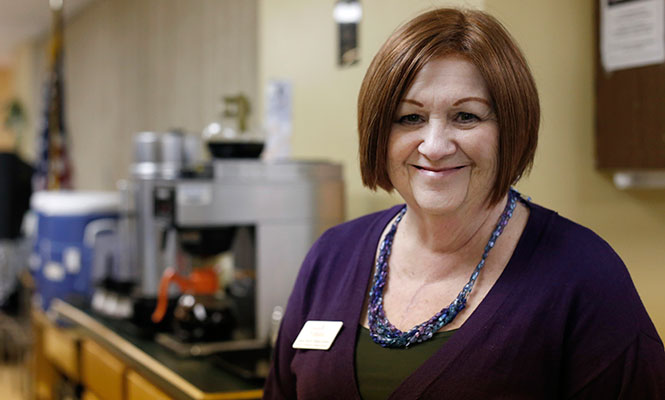Local food pantry keeps doors open during freezing temperatures
Anne Marie Mann-Noble, the Director of Emergency and Outreach Services for Family & Community Services, stands by the kitchen for the community center in Ravenna on Wednesday, Jan. 29, 2013. The center is open 24 hours a day when the temperature reaches 10 degrees to accommodate the homeless.
January 30, 2014
Cindy Slama found herself homeless three years ago after her then-fiance drained the family’s mortgage money to satisfy his cocaine addiction.
Slama refused to leave the house from which she was being evicted until her brother moved all of her belongings to a tiny Ravenna apartment, leaving her with a fraction of the life she spent years building and little hope for a new beginning. Her family was bitter, telling her she should have been more involved in the affairs of her fiance.
“I feel like I was used,” she said. “It just makes me mad that my brother saw it and he didn’t say ‘Cindy, come on, you know better than this.’ ”
Being diagnosed with multiple sclerosis and struggling with the repercussions of a stroke she had as a teenager, Slama qualified for government aid but got caught up in bureaucratic procedures that kept her waiting in financial limbo for three years.
Slama is just one of dozens of individuals who volunteer at Center of Hope, a food pantry and soup kitchen in Ravenna that served as a warming center for those in need during the extreme inclement weather this week. The center kept its doors open for a full 24 hours Wednesday, offering community members hot coffee and snacks.
The center, a private nonprofit, doesn’t typically house their “clients,” as director Anne Marie Mann-Noble refers to them, but rather offers hot lunch and dinner six days a week in hopes of giving them a safe, judgment-free place to come together. Coordinators of the center purchase food from the Akron-Canton Regional Food Bank to distribute canned goods to clients every 30 days in addition to hot meals. More than 100 people take advantage of this service on any given day, Mann-Noble said.
The center is nearing its 25th anniversary with Sister Jordan Haddad being the original founder and coordinator.
“In my opinion, Sister Jordan was the Mother Teresa of Portage County,” Mann-Noble said of Haddad. “She always felt that those who were less fortunate needed a place. Kind of like a drop-in kind of place, where people could come in for coffee and danish and things like that.”
Mann-Noble has been the director for four years but has been with the agency for 10 and finds volunteerism to be an opportunity for personal growth, introspection and humility. If there’s ever a time to help people in need, she said, the time is now.
“I know we have homeless individuals that in this weather are standing under the bridge, and we haven’t had a cold snap like this in 20 years,” she said. “Just the thought of them not having a place to go … we need to not just be feeding bellies; we need to maybe feed souls.”
The common misconception about the homeless population, she said, is that it only happens to those unwilling to help themselves. Mann-Noble said, most of the clients at the shelter are underemployed for economic or medical reasons. With SNAP, which stands for Supplemental Nutrition Assistance Program, benefits being cut late last year, the center has seen a spike in services demanded.
“We hold the poor to ridiculously high standards — standards that we’d never hold ourselves to,” she said, quoting Haddad.
Portage County resident Diane Brinker was involved with a ministry nursing home for several years, prompting her passion for volunteerism. While this was her first time working for the center, she said she plans to make a continuous effort to return as often as she can.
Brinker is fervent in her belief that homelessness isn’t a one-trick horse.
Breaking the emotional cycle of homelessness is instrumental in eliminating the physical ailment, she said. These emotional barriers would discourage anyone, regardless of upbringing or social status.
“There are so many emotional responses, especially depression,” she said. “Depression can be debilitating and people may look at you and think that you’re lazy … but there are so many emotions involved in that too.”
Slama said she is now in a much better place, financially and emotionally. She volunteers at the shelter as a tribute to her own struggles. During the most troubled time in her life, she was forced to rely on the kindness of strangers, and giving back to those in the same position is her form of gratitude.
“I’m very fortunate; I look at everything I have in my little apartment and I’m so grateful for everything,” she said. “I don’t think there’s enough our county can do for people that are homeless. I think people should thank God every day because you never know what tomorrow’s going to bring.
Contact Chrissy Suttles at [email protected].

























